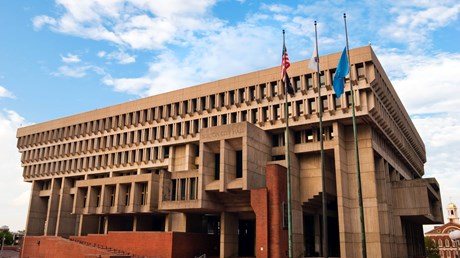The free speech question considered by the Supreme Court this week may hinge on whether the pole counts as a public forum.

There are three flagpoles outside Boston City Hall. One flies the United States flag. Another flies the Massachusetts state flag. What can – and can’t – fly from the third is an issue that the Supreme Court considered during oral arguments on Jan 18.
The case, Shurtleff v. Boston, addresses whether the city violated the First Amendment by denying a request to temporarily raise the Christian flag on a flagpole outside City Hall, where Boston has temporarily displayed many secular organizations’ flags.
During oral arguments, the justices and the parties agreed that if the flagpole is a public forum open to all comers, then the city of Boston would be unable to deny a request to temporarily raise a religious flag, like the Christian flag.
The key question in the case then is this: is the third flagpole a public forum open to all comers or is it government speech?
To answer this question, the court’s decision, which will be handed down later this term, will likely clarify one or more free speech doctrines that I study in my work on free speech and the First Amendment. Such clarification of the court’s free speech doctrine would likely impact how courts nationwide interpret the First Amendment’s guarantees.
Case background
Boston permits groups to request that a flag temporarily fly alongside the American and Massachusetts flags at City Hall to mark special occasions, replacing the city flag that usually occupies the third post. Past examples include flag requests from the Chinese Progressive Association and the National Juneteenth Observance Foundation.
In 2017, Camp Constitution, a New Hampshire-based organization, requested to fly the Christian flag, which has a cross in the upper left corner ...
from Christianity Today Magazine
Umn ministry


.gif)

.gif)
.gif)
